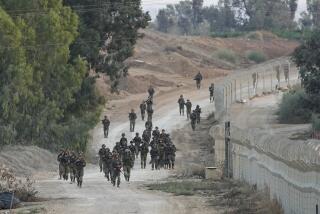The U.S. Deficit in Economic Intelligence
- Share via
The unraveling of Asia’s premier economies beginning in Thailand last summer has produced a bear market in all but one commodity--chagrin. Government officials, bankers, brokers, academics and pundits have admitted that the crisis caught them flat-footed. From Washington to Wall Street, the common denominator was surprise. The same appears true for the intelligence community. No one at the Central Intelligence Agency, the State Department or the Pentagon is talking. But the president’s dismissal of the initial free fall in the Asian currency market as a “blip”’ suggests that the intelligence agencies that provide his daily briefings fared no better than the private sector in foreseeing the extraordinary trouble ahead.
For some of the experts who made these world class misjudgments, the consequences are already clear. On Wall Street, where the returns on once touted Asian mutual funds have fallen on average 40% since July, fund managers and analysts who got it wrong have been moved out. The few who called it right, of course, are moving up. But in general, businessmen are disinclined to see much profit in dwelling on the past. They are moving on, hedging in some markets, buying cheap Asian assets and opening offices in Seoul and Tokyo where financial fixes to failing systems offer new opportunities.
But what about Washington? There, the answer is--or should be--different. Because of the U.S. strategic stake in a successful and stable East Asia, U.S. intelligence needs to examine why it, too, misperceived Asia’s economic strengths and overlooked political and institutional weaknesses. And it needs to commit to doing better as the crisis unfolds and new risks emerge.
Admittedly, providing sophisticated economic intelligence in Washington is not an easy job. Senior policymakers involved in crises have little time or patience for long-term views or warnings about what “might” happen down the road. News capsules and intelligence tidbits packaged in one-page daily briefings are preferred. In fact, at Treasury, State and elsewhere, senior officials often believe they are their own best analysts and dismiss the specialists’ information. And inside intelligence agencies, there can be reluctance to get involved, both in terms of policy and allocation of resources, and among personnel. Economic intelligence hasn’t fit traditional officers’ self-image defined by so-called hard targets--rogue regimes, terrorists and weapons proliferaters--that are unambiguous national security threats.
That said, the intelligence shortcomings need to be addressed, and soon.
Instead of waiting for congressional inquiries or launching lengthy in-house studies, the intelligence agencies’ senior management should settle a few basic questions. If they do, the result will help ensure that the president and his advisors get intelligence with real value as they navigate the turmoil unleashed by Asia’s troubles.
Analysis versus reporting. Spies and analysts shouldn’t compete with journalists and financial news networks. Nothing beats the media in delivering late breaking news, and their experience in reporting wars, revolutions and coups is respectable. On complicated subjects like Asia’s financial crisis, the “me too” reporting effort in intelligence diverts collectors and analysts from their real job: looking beyond the conventional wisdom at alternative views, and pointing out the warning signs of trouble and the consequences if the policymakers’ assumptions go wrong. The profoundly incorrect assessments of Asia’s invincibility by pack journalism and Wall Street’s experts only a few months ago proves the point. Great errors can arise when intelligence regurgitates what others say. In short, producing research-based analysis that looks at the long as well as near term should be the name of the economic intelligence game.
Consensus versus contrarianism. The term “intelligence community” is a euphemism. When events heat up, debates among agencies and analysts almost always follow suit. The written intelligence report, however, often does not reflect the ruckus. As a result, its readers get homogenized views, missing the complexity and alternatives of the analysts’ input. Studies of past intelligence failures have highlighted this danger--the preference for forecasts that skip (or overlook) the low-probability but high-impact scenarios that eventually come to pass. In today’s Asia, markets and political leaders are hard to predict. All the more reason the president and his senior advisors need intelligence estimates and studies that include the full range of the analysts’ views.
Integration versus specialization. Whenever different intelligence experts--political specialists, economists and collectors--have dropped their veils and worked together, the result has always been excellent. The Asian crisis demands no less. The complexity of the critical questions at hand shows why. Japan is a case in point:
A revived Japanese financial system is vital to Asia’s recovery and long-term economic health, but what are the prospects that the politically weak prime minister can push the Finance Ministry, a strong and recalcitrant bureaucracy, to actually clean up the banking system? Can politicians and bureaucrats curb the influence of organized crime, part of an entrenched corruption that hurts the Japanese financial and real estate markets? Do we know the back rooms as well as the board rooms in Japan?
Economists may crunch the numbers, but at this stage in Asia’s crisis, political analysts must contribute their assessments in order to provide a realistic view of how far or fast Asia’s political leaders can go.
It would be easier if economic intelligence could be more clearly defined. The intelligence community should resist the temptation. There are still daily market reports and news summaries to compile for busy senior policymakers. But like business people, intelligence officers must anticipate what their customers need, even if the customers don’t know it quite yet.
Asia’s leaders have an array of choices for coping with unpredictable market forces, with myriad possible economic and political consequences. Analyzing all of this is Job No. 1 for U.S. intelligence today.
More to Read
Sign up for Essential California
The most important California stories and recommendations in your inbox every morning.
You may occasionally receive promotional content from the Los Angeles Times.













